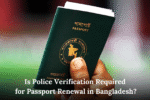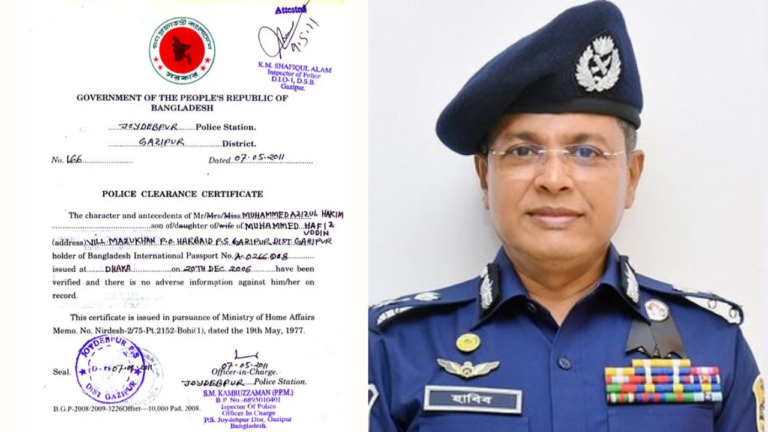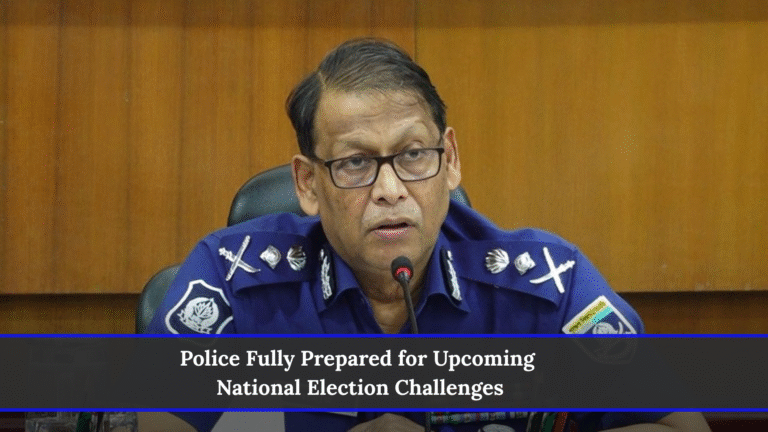Police Clearance Fraud Arrests in Jessore, Including a Ringleader

Police Clearance Fraud Arrests in Jessore, Including a Ringleader. Two people have been arrested in Jessore for allegedly forging police clearance certificates in Bangladesh, raising serious concerns about cyber-related fraud in the region. Among the arrested is the mastermind behind the operation, Golam Kibria Sojib, 27, along with his accomplice, Nahid Shahriar, 28. The arrests shed light on the manipulation of vital government documents, particularly in the process of obtaining police clearance for overseas travel.
Read Also: Police clearance
Mastermind And His Accomplice
Golam Kibria Sojib, son of Golam Mostafa from Teererhat village in Sadar Upazila, reportedly lived in the Kathaltola area of Puraton Kasba Raypara, Jessore. At the Chourasta intersection, he operated a computer and document-processing shop that he allegedly used to carry out forgery operations.
In Jhikargacha Upazila, Nahid Shahriar hails from Parbazar (Thana Mor) and is the son of Abul Kashem. Police clearance challan copies—vital documents for individuals applying for foreign jobs and visas—have been edited and tampered with by the duo.
How the Police Clearance Fraud Was Uncovered
The fraudulent act came to light after a young man named Kazi Ibrahim Hossain (19), son of Kazi Robiul Islam of Puraton Kasba Kazipara, submitted a police clearance application in anticipation of traveling to Saudi Arabia for employment. On the evening of June 14, he approached Sojib’s shop to apply for the certificate. After the application was processed, a printed copy was handed over to his father, Kazi Robiul Alam.
When Mr. Alam examined the document closely, he noticed inconsistencies. He took the matter to the local police station because he was suspicious of potential malpractice. Kotwali Police Station Sub-Inspector Hamidur Rahman confirmed that upon reviewing the police clearance, the applicant’s name did not match. In fact, Nahid Shahriar’s name was fraudulently added to the clearance.
Evidence Seized From The Computer Shop
After this discovery, law enforcement took swift action. Officers raided Sojib’s computer shop and seized the computer used to manipulate the clearance document. Further digital investigation confirmed that the police clearance certificate had been altered. The digital files matched Nahid Shahriar’s details, not Ibrahim.
Based on this evidence, the police traced and arrested Nahid Shahriar in Jhikargacha later that night. The forged clearance document in his possession further proved the collaboration between him and Sojib. Authorities subsequently filed a formal case for fraudulent police clearance certificate creation.
Growing Concerns Over Document Forgery in Bangladesh
This incident is not an isolated one. In recent years, there has been an increase in cybercrime cases related to forged police clearances, fake birth certificates, and other legal documents. With more government services being digitized, document integrity in Bangladesh is becoming a crucial issue.
Obtaining a Police Clearance Certificate in Bangladesh is a necessary step for those seeking employment or migration overseas. Any breach in this system threatens not only individual careers but also the credibility of national institutions.
Police and Government Response
Law enforcement agencies are now tightening surveillance on digital service providers, especially those involved in document processing. In response to rising cases of Jessore cybercrime and document forgery, the police have announced a stricter verification process to validate police clearances.
They urge applicants to use only official platforms such as the PCC Portal (https://pcc.police.gov.bd) to apply for clearance certificates, and avoid third-party operators who promise shortcuts for a fee.
Conclusion
This case serves as a warning for Bangladeshi citizens—especially those applying for jobs abroad—to remain vigilant and use only authentic, government-authorized platforms for sensitive documents. Avoiding unauthorized shops or brokers can protect individuals from falling victim to scams and facing legal consequences.
With increased awareness, stronger regulation, and public cooperation, Bangladesh can fight back against the growing wave of digital fraud that threatens its migration and employment systems.















